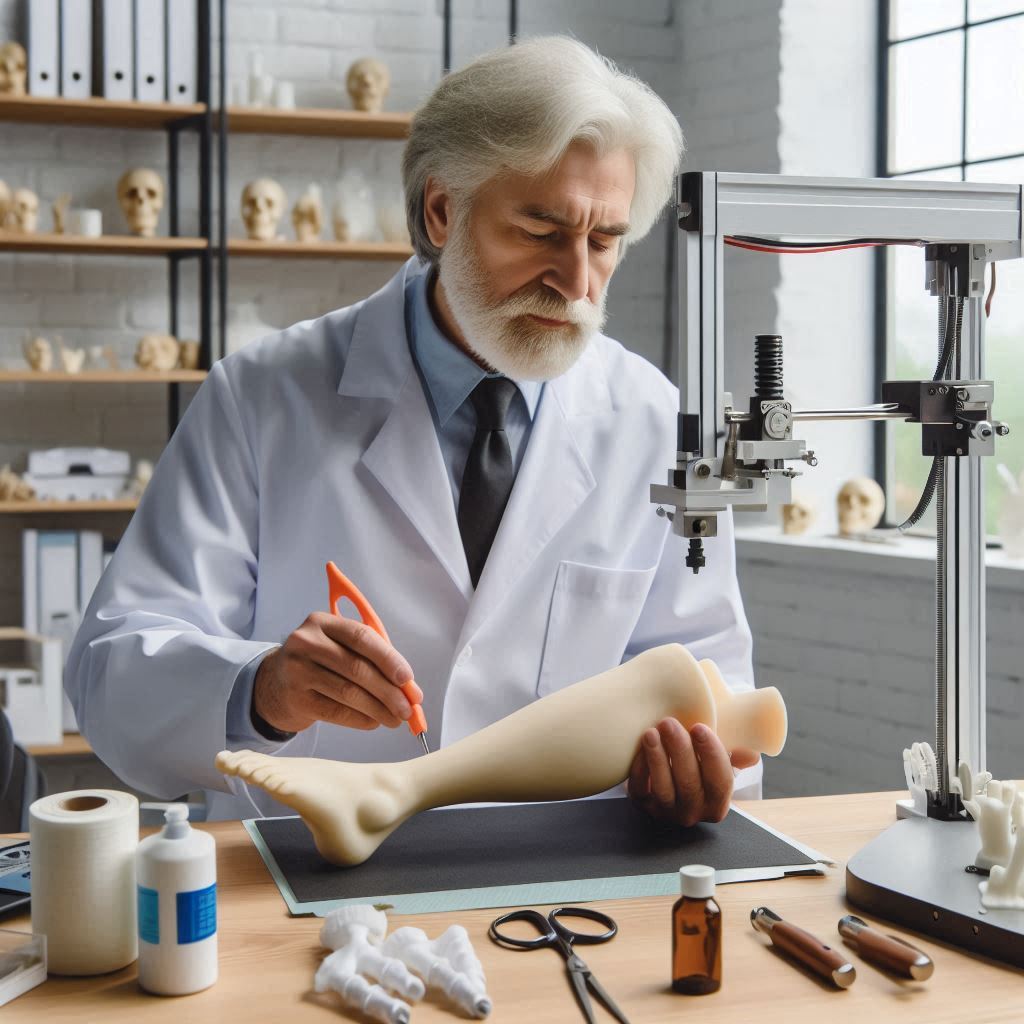Introduction
Orthopedic technologists play a crucial role in the medical field.
They assist orthopedic surgeons during procedures and ensure patient comfort and safety.
Their responsibilities include applying and removing casts, splints, and braces.
They also help in positioning patients for procedures and using imaging equipment like X-rays.
These tasks require precision and a deep understanding of orthopedic techniques and patient care.
Orthopedic technologists are vital in the medical field.
They bridge the gap between surgeons and patients, ensuring smooth procedures and effective recovery.
Their expertise and attention to detail significantly impact patient outcomes.
By maintaining high standards of care, they contribute to the overall success of orthopedic treatments.
Their work directly influences patient satisfaction and recovery rates, highlighting their importance in healthcare.
The importance of orthopedic technologists cannot be overstated.
They support orthopedic surgeons, enhancing the efficiency and effectiveness of surgical procedures.
By preparing and positioning patients correctly, they help prevent complications and improve surgical outcomes.
Their role extends beyond the operating room, as they provide essential post-operative care and patient education.
Education and Training Requirements
Orthopedic technologists play a crucial role in the healthcare system, assisting orthopedic surgeons in the treatment of musculoskeletal injuries and disorders.
To become a successful orthopedic technologist, individuals must fulfill specific education and training requirements.
Education needed to become an orthopedic technologist
Generally, orthopedic technologists start their careers by earning an associate degree in orthopedic technology or a related field.
Coursework typically includes anatomy, physiology, medical terminology, and orthopedic procedures.
Some aspiring orthopedic technologists may choose to pursue a bachelor’s degree for advanced knowledge and career opportunities.
Certification and licensing requirements
After completing their education, orthopedic technologists must obtain certification from the National Board for Certification of Orthopaedic Technologists (NBCOT) to practice professionally.
Certification demonstrates knowledge and skill in the field and is often required by employers.
Additionally, some states may mandate licensure for orthopedic technologists to ensure competency and adherence to professional standards.
Continuing education opportunities to advance in the field
Orthopedic technologists can benefit from pursuing continuing education opportunities to stay current with advancements in orthopedic technology and enhance their skills.
These opportunities include workshops, seminars, conferences, and online courses focused on new techniques, technologies, and best practices in orthopedic care.
Engaging in ongoing education can lead to career advancement and increased job prospects.
Overall, education and training are essential components for orthopedic technologists to excel in their careers and provide quality care to patients.
By meeting these requirements and staying updated with industry trends, orthopedic technologists can enhance their skills, expand their knowledge, and advance in their profession.
Read: Networking Tips for Aspiring Surgical Technologists
Job Duties and Responsibilities
Orthopedic technologists perform various tasks daily.
They assist orthopedic surgeons during procedures, ensuring everything runs smoothly.
They prepare patients by positioning them correctly for surgeries or treatments.
This positioning is crucial for successful outcomes and patient safety.
Technologists apply and remove casts, splints, and braces.
They ensure these devices fit correctly and provide necessary support.
Incorrect application can lead to complications, so precision is vital.
Technologists also instruct patients on how to care for these devices at home, promoting proper healing.
Specialized Skills and Techniques Required for the Job
Orthopedic technologists need specialized skills and techniques.
They must be proficient in using imaging technology like X-rays and MRIs.
These skills are essential for diagnosing and monitoring patients’ conditions accurately.
Technologists also need to understand anatomy and orthopedic procedures thoroughly.
They often assist with minor surgical procedures.
This requires knowledge of sterile techniques and surgical instruments.
Maintaining a sterile environment prevents infections and complications.
Technologists must also know how to handle emergency situations calmly and efficiently.
They need excellent communication skills.
They explain procedures to patients and answer their questions.
Clear communication helps patients feel comfortable and informed about their care.
Technologists also need to work well with other healthcare professionals, ensuring cohesive patient care.
Importance of Attention to Detail and Accuracy in This Role
Attention to detail and accuracy are paramount for orthopedic technologists.
They handle delicate tasks that directly impact patient outcomes.
For example, incorrect positioning during an X-ray can result in a misdiagnosis.
This could lead to inappropriate treatment and delayed recovery.
Technologists must accurately document patient information and treatment details.
Accurate records ensure that all healthcare providers have the information they need to provide optimal care.
Mistakes in documentation can lead to serious consequences for patients.
They also need to follow protocols and guidelines meticulously.
This ensures that procedures are performed safely and effectively.
Any deviation from established protocols can compromise patient safety and treatment efficacy.
Precision is crucial when applying casts, splints, and braces.
These devices must fit correctly to support healing and prevent further injury.
Any mistake in application can lead to discomfort or complications for the patient.
Basically, the role of an orthopedic technologist is multifaceted and demanding.
They perform a wide range of tasks that require specialized skills and techniques.
Attention to detail and accuracy are essential for ensuring patient safety and successful outcomes.
By mastering these aspects of the job, orthopedic technologists can excel in their careers and provide exceptional care to their patients.
Read: Common Challenges Faced by Surgical Technologists
Advancing Your Career
Orthopedic technologists play a crucial role in the healthcare industry by assisting orthopedic surgeons in the treatment of musculoskeletal conditions.
However, like any other profession, it is essential for orthopedic technologists to actively pursue opportunities for growth and advancement in their career.
Opportunities for Growth and Advancement in the Field
Continuing Education
One of the most effective ways to advance in the field of orthopedic technology is by pursuing continuing education.
This can include attending conferences, workshops, and seminars to stay updated on the latest advancements in the field.
By continually expanding their knowledge base, orthopedic technologists can enhance their skills and expertise, making them more valuable assets to their healthcare team.
Certification
Obtaining certifications in specialized areas of orthopedic technology can open up new opportunities for career advancement.
For example, becoming certified in orthopedic bracing or casting can allow technologists to work in more specialized settings and increase their earning potential.
Additionally, certifications demonstrate a commitment to excellence and can help technologists stand out to employers.
Leadership Roles
As orthopedic technologists gain experience in the field, they may have the opportunity to take on leadership roles within their workplace.
This can include supervisory positions, training new technologists, or even managing orthopedic departments.
By showcasing their leadership skills and ability to work effectively with others, technologists can advance their careers to the next level.
Specializations Within Orthopedic Technology
Orthopedic Bracing
Technologists specializing in orthopedic bracing work closely with patients to design and fit custom braces to support and protect injured or weakened joints.
This specialization requires a strong understanding of anatomy and biomechanics, as well as the ability to communicate effectively with patients to ensure proper brace placement.
Casting and Splinting
Technologists who specialize in casting and splinting create custom orthopedic casts and splints to immobilize and support fractures or other injuries.
This specialization requires precision and attention to detail, as well as knowledge of different casting materials and techniques.
Technologists must also have strong patient care skills to ensure the comfort and safety of their patients.
Surgical Technologists
Some orthopedic technologists choose to specialize in assisting orthopedic surgeons during surgical procedures.
This role requires a high level of technical proficiency, as well as the ability to anticipate the needs of the surgeon during complex procedures.
Surgical technologists must be able to work quickly and efficiently under pressure while maintaining a sterile surgical environment.
How to Stay Current and Up-to-Date in the Field to Advance Your Career
- Join Professional Organizations: By joining organizations such as the National Association of Orthopedic Technologists, technologists can access valuable resources, networking opportunities, and continuing education programs to help them stay current in the field.
- Attend Conferences and Workshops: Attending orthopedic conferences and workshops is a great way to stay updated on the latest trends and advancements in the field. These events also provide opportunities to network with other professionals and learn from experts in the field.
- Read Professional Journals and Publications: Subscribing to orthopedic journals and publications can keep technologists informed about the latest research, techniques, and technologies in orthopedic technology. Staying informed about industry trends can help technologists adapt to changes in the field and position themselves for career advancement.
By actively seeking opportunities for growth and advancement, staying current in the field, and specializing in key areas of orthopedic technology, technologists can advance their careers and make a lasting impact in the healthcare industry.
Read: Advancement Opportunities for Surgical Technologists

Salary and Job Outlook
Orthopedic technologists play a crucial role in healthcare, specializing in assisting orthopedic surgeons in various procedures.
They are responsible for preparing operating rooms, setting up equipment, and ensuring patient safety during surgeries and treatments.
Transform Your Career Today
Unlock a personalized career strategy that drives real results. Get tailored advice and a roadmap designed just for you.
Start NowAverage Salary Range for Orthopedic Technologists
Orthopedic technologists earn competitive salaries based on their experience, education, and geographic location.
The average salary range for orthopedic technologists typically falls between $40,000 to $60,000 per year.
Job Growth Projections in the Field
The job outlook for orthopedic technologists is promising, with an expected growth rate of 12% over the next decade.
This growth is attributed to the increasing demand for orthopedic procedures as the population ages.
Factors That Can Affect Salary and Job Opportunities
Several factors can influence the salary and job opportunities for orthopedic technologists.
These include level of experience, certifications, specialized skills, and the size and location of the healthcare facility.
Having advanced certifications and specialized skills can lead to higher salary offers and more job opportunities.
Additionally, working in larger metropolitan areas or prestigious healthcare institutions may also result in increased earning potential.
In essence, orthopedic technologists can expect a competitive salary range and promising job growth opportunities in the field.
By focusing on gaining experience, acquiring advanced certifications, and honing specialized skills, orthopedic technologists can advance their careers and achieve success in the healthcare industry.
Read: Work Environment for Surgical Technologists: Hospitals vs. Clinics
See Related Content: Implementing Health Education in Rural Communities
Networking and Professional Development
Importance of networking in advancing your career
Networking is crucial for career advancement as it helps in building connections, gaining insights, and fostering collaborations.
Effective networking can open up opportunities for career growth, job promotions, and access to new learning experiences.
By connecting with professionals in the field, orthopedic technologists can stay updated on industry trends and best practices.
Networking also provides a platform for sharing knowledge, exchanging ideas, and seeking mentorship from experienced professionals.
Building a strong professional network can enhance credibility, increase visibility, and pave the way for future career prospects.
Professional organizations and associations for orthopedic technologists
There are various professional associations specifically tailored for orthopedic technologists to help them advance in their careers.
The National Association of Orthopedic Technologists (NAOT) is one such organization that offers certification, training, and networking opportunities.
The American Society of Orthopedic Professionals (ASOP) is another prominent association that provides resources, education, and advocacy for orthopedic professionals.
Joining these organizations can provide access to conferences, workshops, seminars, and other professional development activities.
Being a member of professional organizations can also enhance credibility, showcase expertise, and demonstrate commitment to the field.
How to build a professional network in the field
Attend industry events, conferences, workshops, and seminars to meet and connect with other orthopedic professionals.
Utilize social media platforms like LinkedIn to network with peers, share knowledge, and participate in online discussions.
Join relevant online forums, discussion groups, and communities to engage with like-minded professionals and expand your network.
Seek mentorship from experienced professionals in the field to gain valuable insights, advice, and guidance for career advancement.
Be proactive in reaching out to potential contacts, attending networking events, and following up with connections to nurture relationships.
Transform Your Career Today
Unlock a personalized career strategy that drives real results. Get tailored advice and a roadmap designed just for you.
Start NowNetworking and professional development play a vital role in advancing the career of orthopedic technologists.
By actively engaging in networking activities, joining professional organizations, and building a strong professional network, orthopedic technologists can enhance their career prospects, stay updated on industry trends, and showcase their expertise in the field.
Continuous learning, collaboration, and mentorship are key components of professional development that can help orthopedic technologists succeed in their careers and contribute to the growth of the healthcare industry.
Tips for Success
When considering a career as an orthopedic technologist, it’s important to have a clear understanding of the field and what it entails. Here are some tips for success:
Advice for those considering a career as an orthopedic technologist
- Research the role and responsibilities of an orthopedic technologist to ensure it aligns with your interests and skills.
- Shadow a professional in the field to gain firsthand experience and insight into the day-to-day duties of the job.
- Obtain the necessary education and training, such as completing a formal orthopedic technology program or certification.
- Develop strong communication and interpersonal skills, as you will be working closely with patients, physicians, and other healthcare professionals.
- Stay informed about advancements in orthopedic technology and be willing to continuously learn and adapt to changes in the field.
Tips for excelling in the field and standing out from the competition
- Seek opportunities for professional development, such as attending conferences, workshops, and seminars related to orthopedic technology.
- Build a strong professional network by connecting with other orthopedic technologists, physicians, and healthcare organizations.
- Demonstrate a strong work ethic, attention to detail, and a commitment to providing high-quality care to patients.
- Stay organized and efficient in your work to ensure timely and accurate completion of tasks and responsibilities.
- Seek feedback from supervisors and colleagues to identify areas for improvement and strive for continuous growth and development.
How to set and achieve career goals in orthopedic technology
- Establish clear and achievable short-term and long-term goals that align with your interests, skills, and values.
- Create a plan outlining the steps you need to take to achieve your career goals, including obtaining additional certifications or specialized training.
- Regularly assess your progress towards your goals and make adjustments as needed to stay on track and overcome any challenges or obstacles.
- Seek mentorship from experienced orthopedic technologists who can provide guidance and support as you work towards your goals.
- Celebrate your accomplishments and milestones along the way to stay motivated and focused on achieving your ultimate career objectives.
- By following these tips and strategies, you can position yourself for success in the field of orthopedic technology and advance your career to new heights. Remember to stay dedicated, motivated, and always strive for excellence in all that you do.
Discover More: Orthopedic Technologist: Work-Life Balance Tips
Conclusion
Orthopedic technologists play a vital role in the medical field.
Their expertise ensures effective treatment and patient care.
They assist surgeons during procedures and handle critical tasks like applying and removing casts, splints, and braces.
This support is crucial for successful patient outcomes and smooth operations in orthopedic care.
Advancing your career as an orthopedic technologist offers numerous benefits.
Continuing education and gaining specialized skills can lead to higher positions and increased responsibilities.
These advancements not only enhance your professional growth but also contribute to better patient care.
By staying current with new techniques and technologies, you can provide the highest level of care.
For those looking to advance in this field, dedication and commitment are key.
Pursuing further education, obtaining certifications, and gaining experience in specialized areas can open new career opportunities.
Networking with professionals in the field and joining relevant organizations can also provide valuable insights and connections.
A career as an orthopedic technologist is rewarding on many levels.
You make a significant impact on patients’ lives, helping them recover from injuries and improve their quality of life.
The satisfaction of seeing patients heal and regain their mobility is immense.
This role offers a unique blend of technical skills, patient interaction, and the opportunity to work closely with other healthcare professionals.
The demand for orthopedic technologists continues to grow.
As the population ages and more people seek treatment for musculoskeletal issues, the need for skilled technologists increases.
This growth presents many opportunities for career advancement and job stability in the healthcare industry.
[E-Books for Sale]
The Big Book of 500 High-Paying Jobs in America: Unlock Your Earning Potential
$19.99 • 500 High-Paying Jobs • 330 pages
Explore 500 high-paying jobs in America and learn how to boost your career, earn more, and achieve success!
See All 500 High-Paying Jobs of this E-Book
1001 Professions Without a Degree: High-Paying American Jobs You Can Start Now
$19.99 • 1001 Professions Without a Degree • 174 pages
Discover 1001 high-paying jobs without a degree! Unlock career tips, skills, and success strategies for just $19.99!




